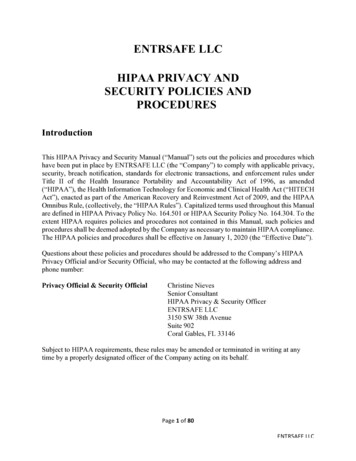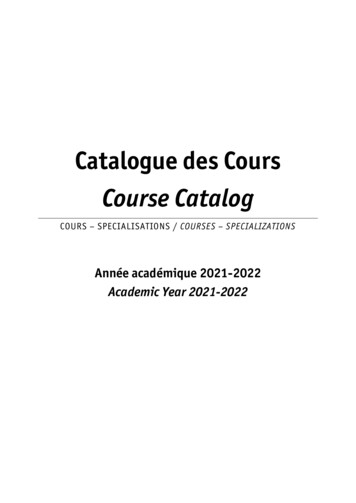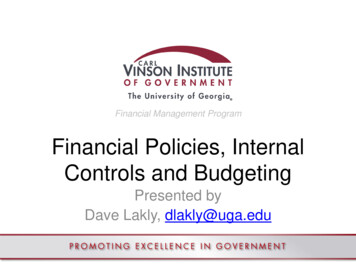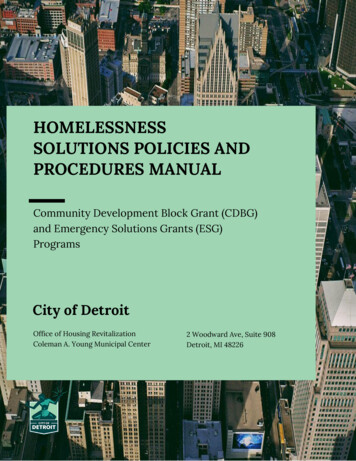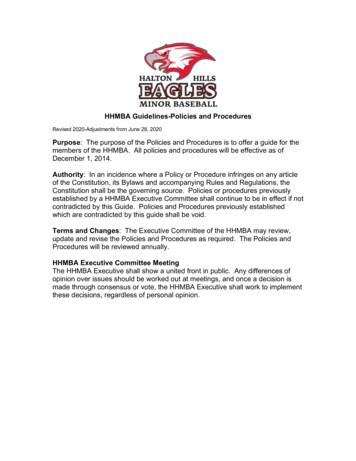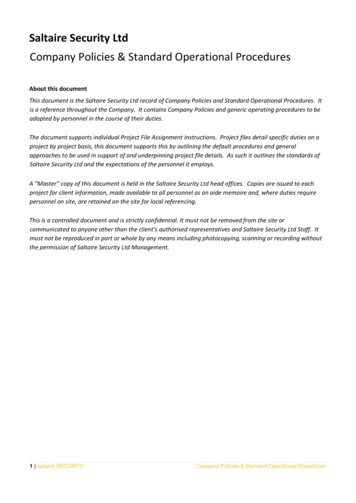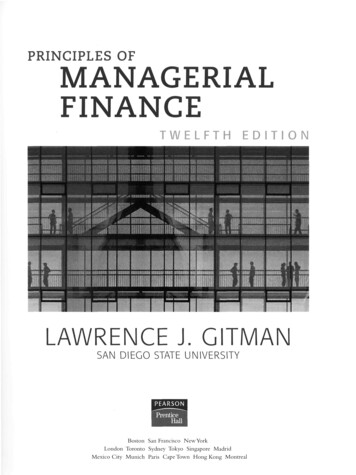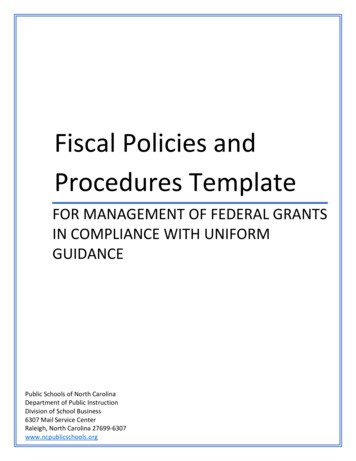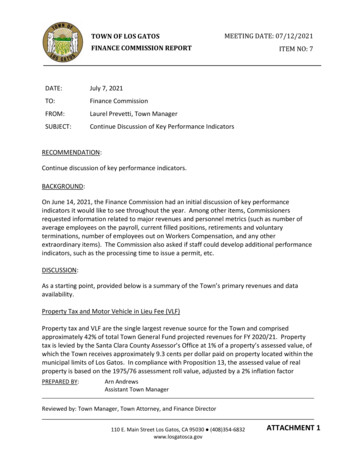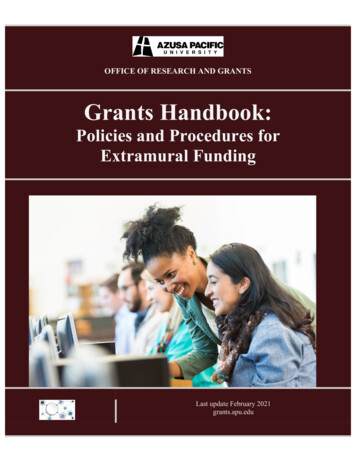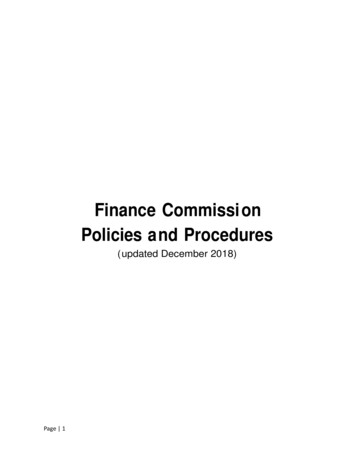
Transcription
Finance Commissi onPolicies and Procedures(updated December 2018)Page 1
Table of ContentsStrategic Planning .Page 3Presiding Officer .Page 4Standards of Conduct Page 7Ethics Policy . . Page 14Training .Page 19Separation of Functions . . Page 21Public Testimony . . .Page 23Hearings Officer and Auditor . .Page 25Sharing of Staff, Equipment, and Facilities: Allocation of Costs .Page 26Research . . .Page 28Liquidity Policy .Page 31Finance Commission of Texas Expense Reimbursement Policy .Page 33Finance Agency Budgeting and Travel Reporting.Page 35Page 2
STRATEGIC PLANNINGStatuteSection 11.002. PURPOSE OF COMMISSION; STRATEGIC PLAN.(a) The finance commission is responsible for overseeing and coordinating the Texas Department of Banking,the Department of Savings and Mortgage Lending, and the Office of Consumer Credit Commissioner andserves as the primary point of accountability for ensuring that state depository and lending institutions functionas a system, considering the broad scope of the financial services industry. The finance commission is thepolicy-making body for those finance agencies and is not a separate state agency. The finance commissionshall carry out its functions in a manner that protects consumer interests, maintains a safe and sound bankingsystem, and increases the economic prosperity of the state.(b) The finance commission shall prepare and periodically update a strategic plan for coordination of the statefinancial system. Each finance agency shall cooperate in preparation of the plan.Policy StatementThe Finance Commission recognizes the benefit of sound short-term and long-term planning and the need toprovide oversight for the regulatory responsibilities of each Finance Commission agency (finance agency) in amanner intended to protect the integrity of the state's financial system as well as to promote economicprosperity. In this regard, the Finance Commission will prepare and adopt a five-year strategic plan eachbiennium. Revisions and updates to the plan are permitted, but shall be limited to items that are material innature and that will result in significant changes to the goals and objectives of the Finance Commission.The Chair of the Finance Commission will appoint three members to serve on a Strategic Planning Committee.The Strategic Planning Committee shall be responsible for the oversight of the preparation and update of thestrategic plan so that it encompasses the goals and objectives of the Finance Commission. The plan willembody the high-level goals, objectives and discussions of the finance agency plans.Page 3
PRESIDING OFFICERStatuteSection 11.007. PRESIDING OFFICER.(a) The governor shall appoint a member of the finance commission as presiding officer of the commission.The presiding officer serves at the will of the governor.(b) The presiding officer shall preside at and provide for the keeping of minutes of each public meeting of thefinance commission.(c) The presiding officer may:(1) adopt rules and procedures as the presiding officer considers necessary for the orderly operation ofthe finance commission and for communication among the finance commission, the Texas Department ofBanking, the Department of Savings and Mortgage Lending, and the Office of Consumer CreditCommissioner;(2) adopt internal procedures governing the time and place of meetings, the type of notice for special publicmeetings, the manner in which public meetings are to be conducted, and other similar matters; and(3) appoint committees composed of finance commission members as the presiding officer considersnecessary to carry out the commission's business.Policy StatementMeetings of the Finance Commission will be conducted with decorum and respect for all parties attending andappearing before the Commission. In furtherance of providing for the orderly operations of the Commission,the presiding officer (Chair) may designate a Vice-Chair. In the Chair's absence, the Vice-Chair will conductand complete all business before the Commission in accordance with applicable statutes, proper open meetingprotocols and these Finance Commission policies. The rules contained within the current edition of Robert'sRules of Order Newly Revised shall govern the Commission in all cases to which they are applicable and inwhich they are not inconsistent with these policies and any special rules the Finance Commission may adopt.In furtherance of Section 11.103(a)(5), Texas Finance Code, each member of the Commission shall notify theChair of an expected absence from a meeting of the Commission as soon as practicable after learning of theevents that will cause the absence. The member shall also notify the Chair of the reasons for the expectedabsence. At the meeting where the member is absent, the Chair shall call for a vote of all members inattendance on whether the absence is excused.The Chair will assign members to the Finance Commission cornrnittees. Standing committees are the AuditCommittee, the Study Committee, and the Strategic Planning Committee. Committee membership will beassigned or reaffirmed annually, to become effective September 1, upon member replacement, or as the Chairdetermines necessary or appropriate. Each committee's membership will normally be, but is not required toPage 4
be, comprised of three members. From a committee's membership, the Chair will designate a Chairperson foreach committee. All considerations of a committee, other than adoption of minutes, are recommendations forfull Finance Commission action.The Chair of the Finance Commission shall appoint members to serve on ad hoc committees as the needarises. The Chair shall designate a Chairperson for each such committee.The Chair and Vice-Chair of the Finance Commission serve in an ex-officio non-voting capacity on eachstanding committee and each ad hoc committee. However, when the Chairperson of a committee learns thatone or more members of a committee will be unable to attend a scheduled meeting such Chairperson mayrequest that either the Chair or Vice-Chair of the Finance Commission (or both if more than one member willbe absent) serve on the committee in a voting capacity on a one-time basis at the scheduled meeting. Theminutes of the scheduled meeting shall reflect the actual voting membership of the committee.The Chair will designate Commission members to coordinate the annual evaluation process of the threefinance agency commissioners. This ad hoc committee will include at least one public member and threeindustry members (one industry member representing each finance agency).The Finance Commission reserves to itself as a body the responsibility for passing upon and prescribing themanner of communication of matters of policy which represent the official position of the Finance Commission.Accordingly, it would be inappropriate for individual members to communicate official positions of the FinanceCommission unless instructed or authorized to do so by an action of the Commission.The Audit Committee shall be responsible for: providing oversight of the finance agencies' internal audit function, including:ointerviewing and recommending the selection of an internal auditor,oreviewing and recommending the actions to be taken as a result of the annual riskassessments performed by the internal auditor,oreviewing, with the internal auditors, the audit scope and plan of the internal auditors,oreviewing and recommending the actions to be taken on the audit plan resulting from theannual internal audit reports, including management's responses thereto, and monitoring thefinance agencies' corrective actions. reviewing and monitoring the action plans resulting from external audits conducted by state and federalagencies, including management's responses thereto, and monitoring the finance agencies' correctiveactions. reviewing and recommending the actions to be taken if any on the annual operating budgets, quarterlyfinancial statements, and investment reports of the finance agencies. Providing oversight and administration of the Texas Financial Education Endowment, includingrecommending the actions to be taken on the investment of funds and awarding of grants that supportthe objectives of the endowment.Page 5
A Certified Public Accountant member of the Finance Commission shall be appointed as a member of theCommittee unless specifically excluded by a majority vote of the Finance Commission.The Study Committee shall be responsible for: coordinating and reviewing any statutorily-required or authorized research studies or projects decidedto be undertaken, as well as those determined to be necessary by the Finance Commission. monitoring and overseeing Legislative Interim Studies as appropriate. monitoring and overseeing activities related to the self-directed, semi-independent (SDSI) status ofthe finance agencies by conferring with the finance agencies on material interests, issues and mattersrelated to SDSI status, as well as monitoring general reporting requirements to governing bodies andthe state legislature associated with the SDSI status, and exploring additional strategies with financeagency heads regarding implementation and operational policies related to SDSI status. reviewing and making recommendations for updates to the policies and procedures of the FinanceCommission every biennium. monitoring the Sunset Review process as appropriate, for the Finance Commission and its financeagencies.On recommendation of the finance agencies or as required by law, the Study Committee may conduct researchon: The availability, quality and prices of financial services, including lending and depository servicesoffered to agricultural businesses, small businesses, and individual consumers in this state, and The practices of business entities in this state that provide financial services to agricultural businesses,small businesses, and individual consumers in this state.The Strategic Planning Committee shall be responsible for: providing direction for and review of the strategic plans developed by each of the finance agenciesunder the Finance Commission. defining the scope and development of the Finance Commission's strategic plan ensuring alignmentwith legislative mandates, industry and economic indicators, and finance agency strategic plans. playing an active role in legislative hearings and communications with elected officials. overseeing the selection of the finance agency heads.Page 6
STANDARDS OF CONDUCTStatuteSection 11.109. STANDARDS OF CONDUCT.The presiding officer of the finance commission or the presiding officer's designee shall provide to membersof the finance commission, as often as necessary, information regarding the requirements for office under thistitle, including information regarding a person's responsibilities under applicable laws relating to standards ofconduct for state officers.Policy StatementSubchapter C, Chapter 572, Texas Government Code, specifically addresses Standards of Conduct andConflict of Interest for state officers and employees. Members of the Finance Commission are committed tofollowing these guidelines and abiding by the provisions therein. Portions of the statute applicable to FinanceCommission members are found in Exhibit A. Pursuant to §572.051, Texas Government Code the FinanceCommission and each of the finance agencies under its jurisdiction has adopted an ethics policy.If a member of the Finance Commission or a finance agency commissioner is made aware of a potential conflictof interest involving a member of the Finance Commission or a finance agency commissioner as such conflictsare described in Exhibit A to these Policies and Procedures, it is the duty of that person to report the matter tothe Chair of the Finance Commission, the Chair of the Audit Committee, and the Chair of the Strategic PlanningCommittee. The Chair of the Finance Commission, two committee Chairs, or a majority of the FinanceCommission at a properly posted Finance Commission meeting may engage as deemed appropriate theservices of one or more of the Office of the Attorney General, independent counsel (through prescribedprocedures), its internal auditors, and/or the Office of the State Auditor to determine and report to the FinanceCommission for its consideration the relevant facts and circumstances surrounding the potential conflict ofinterest.Page 7
Exhibit AStandards of ConductSubchapter C, Chapter 572, Texas Government Code, is headed "STANDARDS OF CONDUCT ANDCONFLICT OF INTEREST PROVISIONS." It contains sections that are only applicable to members of theLegislature and these sections have been omitted.The following sections of Subchapter C are applicable to the Finance Commission:§ 572.051. Standards of Conduct; State Agency Ethics Policy(a) A state officer or employee should not:(1) accept or solicit any gift, favor, or service that might reasonably tend to influence the officer oremployee in the discharge of official duties or that the officer or employee knows or should know isbeing offered with the intent to influence the officer's or employee's official conduct;(2) accept other employment or engage in a business or professional activity that the officer oremployee might reasonably expect would require or induce the officer or employee to discloseconfidential information acquired by reason of the official position;(3) accept other employment or compensation that could reasonably be expected to impair theofficer's or employee's independence of judgment in the performance of the officer's or employee'sofficial duties;(4) make personal investments that could reasonably be expected to create a substantial conflictbetween the officer's or employee's private interest and the public interest; or(5) intentionally or knowingly solicit, accept, or agree to accept any benefit for having exercised theofficer's or employee's official powers or performed the officer's or employee's official duties in favorof another.(b) A state employee who violates Subsection (a) or an ethics policy adopted under Subsection (c) is subjectto termination of the employee's state employment or another employment-related sanction. Notwithstandingthis subsection, a state officer or employee who violates Subsection (a) is subject to any applicable civil orcriminal penalty if the violation also constitutes a violation of another statute or rule.(c) Each state agency shall:(1) adopt a written ethics policy for the agency's employees consistent with the standards prescribedby Subsection (a) and other provisions of this subchapter; and(2) distribute a copy of the ethics policy and this subchapter to:Page 8
(A) each new employee not later than the third business day after the date the person beginsemployment with the agency; and(B) each new officer not later than the third business day after the date the person qualifiesfor office.(d) The office of the attorney general shall develop, in coordination with the commission, and distribute amodel policy that state agencies may use in adopting an agency ethics policy under Subsection (c). A stateagency is not required to adopt the model policy developed under this subsection.(e) Subchapters E and F, Chapter 571, do not apply to a violation of this section.(f) Notwithstanding Subsection (e), if a person with knowledge of a violation of an agency ethics policy adoptedunder Subsection (c) that also constitutes a criminal offense under another law of this state reports the violationto an appropriate prosecuting attorney, then, not later than the 60th day after the date a person notifies theprosecuting attorney under this subsection, the prosecuting attorney shall notify the commission of the statusof the prosecuting attorney's investigation of the alleged violation. The commission shall, on the request of theprosecuting attorney, assist the prosecuting attorney in investigating the alleged violation. This subsectiondoes not apply to an alleged violation by a member or employee of the commission.§ 572.054. Representation by Former Officer or Employee of Regulatory Agency Restricted; CriminalOffense(a) A former member of the governing body or a former executive head of a regulatory agency may not makeany communication to or appearance before an officer or employee of the agency in which the member orexecutive head served before the second anniversary of the date the member or executive head ceased to bea member of the governing body or the executive head of the agency if the communication or appearance ismade:(1) with the intent to influence; and(2) on behalf of any person in connection with any matter on which the person seeks official action.(b) A former state officer or employee of a regulatory agency who ceases service or employment with thatagency on or after January 1, 1992, may not represent any person or receive compensation for servicesrendered on behalf of any person regarding a particular matter in which the former officer or employeeparticipated during the period of state service or employment, either through personal involvement or becausethe case or proceeding was a matter within the officer's or employee's official responsibility.(c) Subsection (b) applies only to:(1) a state officer of a regulatory agency; or(2) a state employee of a regulatory agency who is compensated, as of the last date of stateemployment, at or above the amount prescribed by the General Appropriations Act for step 1, salaryPage 9
group 17, of the position classification salary schedule, including an employee who is exempt from thestate's position classification plan.(d) Subsection (b) does not apply to a rulemaking proceeding that was concluded before the officer's oremployee's service or employment ceased.(e) Other law that restricts the representation of a person before a particular state agency by a former stateofficer or employee of that agency prevails over this section.(f) An individual commits an offense if the individual violates this section. An offense under this subsection isa Class A misdemeanor.(g) In this section, the comptroller and the secretary of state are not excluded from the definition of "regulatoryagency."(g-1) For purposes of this section, the Department of Information Resources is a regulatory agency.(h) In this section:(1) "Participated" means to have taken action as an officer or employee through decision, approval,disapproval, recommendation, giving advice, investigation, or similar action.(2) "Particular matter" means a specific investigation, application, request for a ruling or determination,rulemaking proceeding, contract, claim, charge, accusation, arrest, or judicial or other proceeding.§ 572.056. Contracts by State Officers With Governmental Entities; Criminal Offense(a) A state officer may not solicit or accept from a governmental entity a commission, fee, bonus, retainer, orrebate that is compensation for the officer's personal solicitation for the award of a contract for services or saleof goods to a governmental entity.(b) This section does not apply to:(1) a contract that is awarded by competitive bid as provided by law and that is not otherwise prohibitedby law; or(2) a court appointment.(c) In this section, "governmental entity" means the state, a political subdivision of the state, or a governmentalentity created under the Texas Constitution or a statute of this state.(d) A state officer who violates this section commits an offense. An offense under this subsection is a Class Amisdemeanor.Page 10
§ 572.057. Certain Leases Prohibited(a) Except as provided by Subsection (d), a member of the legislature, an executive or judicial officer electedin a statewide election, or a business entity in which the legislator or officer has a substantial interest may notlease any office space or other real property to the state, a state agency, the legislature or a legislative agency,the Supreme Court of Texas, the Court of Criminal Appeals, or a state judicial agency.(b) A lease made in violation of Subsection (a) is void.(c) This section does not apply to an individual who is an elected officer on June 16, 1989, for as long as theofficer holds that office.(d) A member of the legislature or a business entity in which the legislator has a substantial interest may donatethe use of office space that the member or entity owns and that is located in the member's district to the houseof the legislature in which the member serves to be used for the member's official business. Office spacedonated under this subsection is not a contribution for purposes of Title 15, Election Code. Acceptance of adonation of office space under this subsection is not subject to Section 301.032.§ 572.058. Private Interest in Measure or Decision; Disclosure; Removal From Office for Violation(a) An elected or appointed officer, other than an officer subject to impeachment under Article XV, Section 2,of the Texas Constitution, who is a member of a board or commission having policy direction over a stateagency and who has a personal or private interest in a measure, proposal, or decision pending before theboard or commission shall publicly disclose the fact to the board or commission ina meeting called and heldin compliance with Chapter 551. The officer may not vote or otherwise participate in the decision. Thedisclosure shall be entered in the minutes of the meeting.(b) An individual who violates this section is subject to removal from office on the petition of the attorney generalon the attorney general's own initiative or on the relation of a resident or of any other member of the board orcommission. The suit must be brought in a district court of Travis County or of the county where the violationis alleged to have been committed.(c) If the court or jury finds from a preponderance of the evidence that the defendant violated this section andthat an ordinary prudent person would have known the individual's conduct to be a violation of this section, thecourt shall enter judgment removing the defendant from office.(d) A suit under this section must be brought before the second anniversary of the date the violation is allegedto have been committed, or the suit is barred.(e) The remedy provided by this section is cumulative of other methods of removal from office provided by theTexas Constitution or a statute of this state.(f) In this section, ''personal or private interest" has the same meaning as is given to it under Article Ill, Section22, of the Texas Constitution, governing the conduct of members of the legislature. For purposes of this section,an individual does not have a ''personal or private interest" in a measure, proposal, or decision if the individualPage 11
is engaged in a profession, trade, or occupation and the individual's interest is the same as all others similarlyengaged in the profession, trade, or occupation.§ 572.060. Solicitation Of Or Recommendations Regarding Contributions To Charitable OrganizationsAnd Governmental Entities(a) Unless otherwise prohibited by the Code of Judicial Conduct, a state officer or state employee may:(1) solicit from any person a contribution to:(A) an organization that:(i) is exempt from income taxation under Section 501(a), Internal Revenue Code of1986, by being listed under Section 501(c)(3) of that code;(ii) does not attempt to influence legislation as a substantial part of the organization'sactivities; and(iii) has not elected under Section 501(h), Internal Revenue Code of 1986, to havethat subsection apply to the organization; or(B) a governmental entity; or(2) recommend to any person that the person make a contribution to an organization or entity describedby Subdivision (1).(b) A monetary contribution solicited or recommended as provided by Subsection (a) must:(1) be paid or made directly to the charitable organization or governmental entity by the person makingthe contribution;(2) be in the form of a check, money order, or similar instrument payable to the charitable organizationor governmental entity; or(3) be in the form of a deduction from a state employee's salary or wage payment under the stateemployee charitable campaign under Subchapter I, Chapter 659.(c) A contribution solicited or recommended as provided by Subsection (a) that is not a monetary contributionmust be delivered directly to the charitable organization or governmental entity by the person making thecontribution.(d) A contribution paid as provided by Subsection (b) or delivered as provided by Subsection (c) is not:(1) a political contribution to, or political expenditure on behalf of, the state officer or state employeefor purposes of Title 15, Election Code;(2) an expenditure for purposes of Chapter 305; orPage 12
(3) benefit to the state officer or state employee for purposes of Sections 36.08 and 36.09, PenalCode.Page 13
ETHICS POLICYStatuteSection 572.051. STANDARDS OF CONDUCT; STATE AGENCY ETHICS POLICY.(a) A state officer or employee should not:(1) accept or solicit any gift, favor, or service that might reasonably tend to influence the officer oremployee in the discharge of official duties or that the officer or employee knows or should know isbeing offered with the intent to influence the officer's or employee's official conduct;(2) accept other employment or engage in a business or professional activity that the officer oremployee might reasonably expect would require or induce the officer or employee to discloseconfidential information acquired by reason of the official position;(3) accept other employment or compensation that could reasonably be expected to impair theofficer's or employee's independence of judgment in the performance of the officer's or employee'sofficial duties;(4) make personal investments that could reasonably be expected to create a substantial conflictbetween the officer's or employee's private interest and the public interest; or(5) intentionally or knowingly solicit, accept, or agree to accept any benefit for having exercised theofficer's or employee's official powers or performed the officer's or employee's official duties in favorof another.(b) A state employee who violates Subsection (a) or an ethics policy adopted under Subsection (c) is subjectto termination of the employee's state employment or another employment-related sanction. Notwithstandingthis subsection, a state officer or employee who violates Subsection (a) is subject to any applicable civil orcriminal penalty if the violation also constitutes a violation of another statute or rule.(c) Each state agency shall:(1) adopt a written ethics policy for the agency's employees consistent with the standards prescribedby Subsection (a) and other provisions of this subchapter; and(2) distribute a copy of the ethics policy and this subchapter to:(A) each new employee not later than the third business day after the date the person beginsemployment with the agency; and(B) each new officer not later than the third business day after the date the person qualifiesfor office.Page 14
(d) The office of the attorney general shall develop, in coordination with the commission, and distribute amodel policy that state agencies may use in adopting an agency ethics policy under Subsection (c). A stateagency is not required to adopt the model policy developed under this subsection.(e) Subchapters E and F, Chapter 571, do not apply to a violation of this section.(f) Notwithstanding Subsection (e), if a person with knowledge of a violation of an agency ethics policy adoptedunder Subsection (c) that also constitutes a criminal offense under another law of this state reports the violationto an appropriate prosecuting attorney, then, not later than the 60th day after the date a person notifies theprosecuting attorney under this subsection, the prosecuting attorney shall notify the commission of the statusof the prosecuting attorney's investigation of the alleged violation. The commission shall, on the request of theprosecuting attorney, assist the prosecuting attorney in investigating the alleged violation. This subsectiondoes not apply to an alleged violation by a member or employee of the commission.Note:Under§572.051(d), theterm"commission"meanstheTexasEthicsCommission. Under§572.051(e), Subchapters E and F, Chapter 571, Texas Government Code (made inapplicable to a violationof this Section) set out respectively the procedures (including hearings) for dealing with certain complaintsby the Texas Ethics Commission and the institution by the Texas Ethics Commission of civil and enforcementprocedures related to certain alleged violations of law. Section 2261.252. TEXAS GOVERNMENT CODE.DISCLOSURE OF POTENTIAL CONFLICTS OF INTEREST; CERTAIN CONTRACTS PROHIBITED.(a) Each state agency employee or official who is involved in procurement or in contract management for astate agency shall disclose to the agency any potential conflict of interest specified by state law or agencypolicy that is known by the employee or official with respect to any contract with a private vendor or bid forthe purchase of goods or services from a private vendor by the agency.· (a-1) A state agency employee or official is required to disclose under Subsection (a) any potential conflict ofinterest specified by state law or agency policy that is known by the employee or official at any time during:(1) the procurement process, from the initial request for bids
are described in Exhibit A to these Policies and Procedures, it is the duty of that person to report the matter to the Chair of the Finance Commission, the Chair of the Audit Committee, and the Chair of the Strategic Planning Committee. The Chair of the Finance Commission, two committee Chairs, or a majority of the Finance

